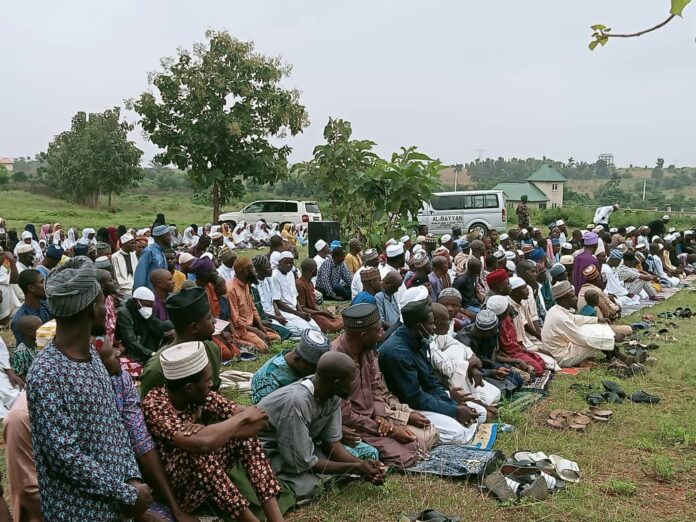In response to a prolonged drought that has severely impacted Osun State, Muslim faithful gathered on Sunday at the Osogbo Central Eid Prayer Ground to seek divine intervention for rainfall. The drought, which has persisted across the state’s 30 local government areas, has left farmers struggling with failed crops and diminished water supply.
The special prayer session was led by Sheikh Musa Animashaun, the Grand Imam and Chairman of the League of Imams and Alfas in Osun State. During the session, Sheikh Animashaun called on the community to turn to God for mercy and relief. He emphasized that the drought could be a consequence of sin and urged the faithful to reassess their relationship with God, emphasizing the importance of repentance and sincere prayer.
The gathering at the Osogbo Central Eid Prayer Ground was a significant event for the Muslim community in Osun State. As they assembled in their hundreds, the faithful expressed a deep sense of urgency and reliance on divine intervention to address the challenges posed by the drought.
Sheikh Animashaun, in his address, highlighted the teachings of Prophet Muhammad, who advised the faithful to seek Allah’s guidance and forgiveness during times of hardship. “Whenever there is a threat of drought, we are enjoined by Allah (SWT) through His Prophet Muhammad (S.A.W) to return to Him, seek His guidance, and ask for His forgiveness,” the Grand Imam stated. He reminded the congregation that true repentance and devotion are essential for divine intervention.
The prayer session was attended by various religious leaders and a broad cross-section of the Muslim community. The leaders emphasized that fearing Allah and maintaining a strong spiritual connection is key to ensuring that their prayers for rain would be answered. The call for collective prayer and repentance resonated deeply with those in attendance, many of whom have been directly affected by the ongoing drought.
The 2024 planting season in Osun State has been severely disrupted by irregular rainfall, a situation that has been exacerbated by broader climate challenges. Farmers in the region have reported significant losses due to the inadequate water supply. Crops that are typically abundant during this time of year have failed to reach maturity, with many remaining stunted and unable to produce seeds.
This agricultural crisis has had far-reaching consequences, not just for the farmers but for the entire state’s food security. The lack of rain has led to dwindling water levels in rivers and reservoirs, making it difficult for communities to access clean water for both farming and daily use. The economic impact is also being felt, as the agricultural sector is a significant contributor to the state’s economy.
In light of these challenges, the special prayer session in Osogbo was more than just a religious gathering; it was a collective call to action. Sheikh Animashaun, in a statement preceding the event, had called on Muslims from all associations within the state to participate in the prayer. He extended invitations to leading Imams, their congregations, and various Islamic groups, including Ratibi Imams, Madrasat, Alasalatu, Saidas, Tijaniyat, Qadiriyat, MSS, and Jamaat Ahlu Sunnah.
The prayer session, which was held at the new Eid ground on Ibokun Road, was focused on invoking divine intervention not only for rain but also for peace in Osogbo and its environs. The Grand Imam’s message was clear: the community must come together in faith and seek Allah’s mercy for the rain that is so desperately needed.
Droughts are not uncommon in Nigeria, particularly in the northern regions. However, the current situation in Osun State is part of a broader pattern of irregular weather patterns that have been linked to climate change. According to climate experts, the increasing frequency and intensity of droughts in Nigeria are likely to continue unless there is a significant global effort to mitigate climate change.
In recent years, Nigeria has experienced a mix of extreme weather events, including flooding in some areas and drought in others. These extremes have had a devastating impact on agriculture, which remains the backbone of the country’s economy.

